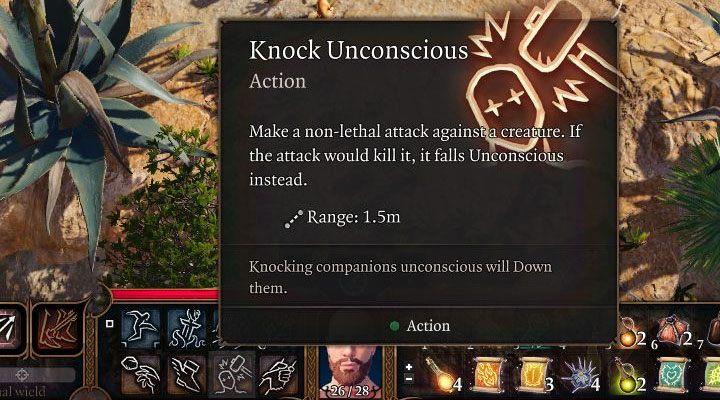In the world of Baldur’s Gate 3, the line between mercy and mayhem can be razor-thin, especially when faced with foes you’d rather not kill. Enter the Knock Unconscious action—a tactical maneuver that allows players to incapacitate enemies without sealing their fate. This guide delves into the mechanics of non-lethal damage, revealing how to master this skill to spare lives, loot inventories, and navigate the complex moral landscape of your adventures. Whether you’re looking to keep a potential ally alive or simply avoid the consequences of murder, understanding how to effectively use this action can turn the tide in your favor.
Availability and limitations of the Knock Unconscious action
The Knock Unconscious action in Baldur’s Gate 3 is available from the start of the game and can be utilized by all party members without needing to unlock it through leveling up. This action allows players to incapacitate enemies using unarmed strikes or melee attacks, ensuring that the target is left with one health point instead of being killed. However, there are notable limitations; certain creatures, particularly undead, are immune to being knocked unconscious and must be defeated outright. Additionally, while this feature can help avoid permanent character deaths that may hinder quest progression, it does not always lead to favorable outcomes in terms of NPC reactions post-encounter, as some may still harbor hostility towards the player for their actions.
- Knocking enemies unconscious is a passive action, while the Knock Unconscious shortcut itself is on the special actions bar.
- All party members can do it. It doesn’t need to be unlocked by level up. It is also available from the very start of the game.
- Enemies can be knocked unconscious with unarmed strikes and melee attacks. Using it means the final attack, which would normally kill the character, will knock them unconscious instead, sparing their life.
- Some monsters are immune to unconsciousness, including all undead. These enemies must be killed off.
When to knock people unconscious?
Using the Knock Unconscious action in Baldur’s Gate 3 is a strategic choice for players looking to incapacitate enemies without resorting to lethal force. This action is particularly useful in scenarios where you want to remove a character from combat without killing them, allowing for potential future interactions or quest opportunities. For instance, knocking out NPCs can provide access to their inventories without the repercussions of murder, which might block certain quest lines or alter the game’s narrative. Additionally, it serves as a non-lethal way to handle allies who may be mind-controlled or otherwise compelled to attack, enabling players to temporarily disable them while seeking alternative solutions. However, it’s advisable to use this option judiciously, as it may not always be the best course of action in every encounter.
- You should use this action if you want to eliminate a character from combat but not kill them. Character deaths can hinder you later on, for example, by blocking access to quests or certain quest routes.
- Unconscious characterscan be easily robbed. You can empty out their entire inventory. You won’t need pickpocketing or Sleight of Hand checks.
- The action also comes in handy if one of your party members is mind controlled or otherwise compelled to attack their allies. This way you can temporarily disable them without needing to kill them.
What are the best strategies for using Knock Unconscious in combat
Best Strategies for Using Knock Unconscious in Combat
Using the Knock Unconscious action in Baldur’s Gate 3 can be a game-changer, allowing players to incapacitate enemies without killing them. Here are some effective strategies to maximize this ability during combat:
1. Understand the Mechanics
- Activate Non-Lethal Damage: Before attacking, ensure that you activate the non-lethal damage option from the passive actions bar. This allows all party members to perform non-lethal attacks, ensuring that any final blow that would normally kill an enemy instead knocks them unconscious.
- Melee Attacks Only: Remember that only melee attacks can trigger the Knock Unconscious effect. Ranged attacks and spells will not work, so position your characters accordingly.
2. Target Selection
- Prioritize Key Enemies: Use this action on enemies that pose a significant threat but whose deaths would hinder your progress, such as quest-related NPCs or powerful foes whose loot you want to access later. Knocking them out allows you to rob their inventory without repercussions.
- Mind-Controlled Allies: If a party member is mind-controlled or forced to attack allies, use Knock Unconscious to disable them temporarily without causing permanent harm. This can be a strategic move to regain control of the situation.
3. Timing and Positioning
- End Combat with a Knockout: Plan your attacks so that the last hit on an enemy is non-lethal. This requires careful coordination among party members to ensure that one character delivers the final blow while others support or weaken the target beforehand.
- Avoid Undead Enemies: Be aware that certain creatures, like undead, are immune to being knocked unconscious. Focus your efforts on living foes to make the most of this ability.
4. Tactical Advantages
- Robbing Unconscious Characters: Once an enemy is knocked out, you can freely loot their inventory without needing to roll for pickpocketing or Sleight of Hand checks. This can provide crucial resources and equipment for your party.
- Temporary Disablement: Use this action as a last resort if other methods fail. It’s often better to try spells or potions first before resorting to knocking someone out, especially if they’re a potential ally.
By employing these strategies thoughtfully, players can effectively leverage the Knock Unconscious action in Baldur’s Gate 3, turning combat encounters into opportunities for tactical advantage and resource acquisition.
What are the best weapons to use for knocking enemies unconscious
Best Weapons for Knocking Enemies Unconscious in Baldur’s Gate 3
In Baldur’s Gate 3, effectively using the Knock Unconscious action hinges on selecting the right melee weapons. Here are some of the best options for delivering non-lethal damage:
1. Simple Melee Weapons
- Clubs: These are ideal for non-lethal attacks due to their low damage output and blunt nature. They deal 1d4 bludgeoning damage, making them perfect for ensuring the final blow doesn’t kill the target.
- Daggers: While primarily used for stabbing, daggers can be employed for non-lethal strikes if you activate the non-lethal damage option. Their versatility allows for quick attacks in close combat.
2. Martial Weapons
- Short Swords: Similar to daggers, short swords can be used effectively for non-lethal strikes. Their balance of speed and damage makes them a reliable choice in combat.
- Hand Axes: These can also be used to deal non-lethal damage, offering a bit more reach than clubs or daggers while maintaining the ability to incapacitate foes.
3. Special Weapons
- Quarterstaffs: Great for spellcasters who want to engage in melee, quarterstaffs can deal decent damage while allowing you to knock out enemies without lethal force.
- Whips: Although they have limited damage output, whips can be used creatively to knock out enemies from a distance while keeping them incapacitated.
4. Unarmed Strikes
- Fist Attacks: Characters can also use unarmed strikes to deal non-lethal damage. This is particularly useful for characters with high Dexterity or Strength, allowing them to deliver powerful blows without the risk of killing their opponent.
Tips for Successful Use
- Always activate the non-lethal damage option before your attack. This ensures that any potential killing blow will instead render your target unconscious.
- Focus on melee attacks exclusively, as ranged weapons and spells cannot deliver non-lethal damage.
- Combine powerful attacks with a weaker final blow to ensure you knock enemies unconscious instead of killing them.
By strategically choosing your weapons and understanding how to execute non-lethal attacks effectively, you can incapacitate foes and navigate the complexities of Baldur’s Gate 3 without resorting to murder.

